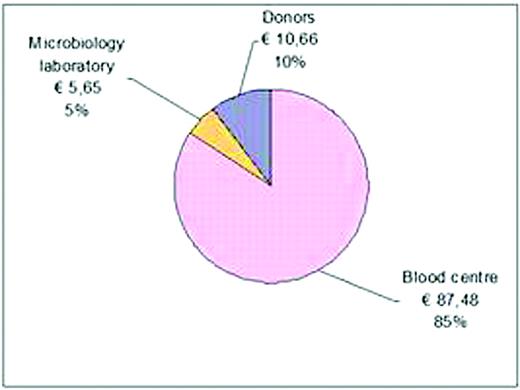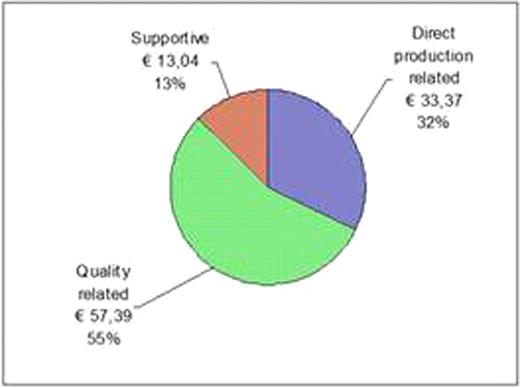Abstract
Abstract 4534
The cost and value of blood products is regularly underestimated since the purchase cost does not represent the total cost for obtaining and producing blood components. Historical accounting attempts to assess the cost of erythrocyte concentrate have varied in scope, perspective and methodology.
To calculate the societal acquisition and preparation cost of erythrocyte concentrate on a national level in Sweden for 2007.
We derived a time-driven activity-based costing model taking into consideration blood centre costs and donor costs for producing one bag of erythrocyte concentrate. Data for this study is collected in 3 Swedish blood centres of different types and related microbiology laboratories. The following simplified formula illustrates the calculation steps: Societal cost of erythrocyte concentrate = Σ (direct labour time x activity rate x labour capacity cost rate) + Σ (direct equipment time x activity rate x equipment capacity cost rate) + Σ donor time x national value of production + Σ cost donor transport. A weighted average, based on each blood centres' representativeness, results in the cost per unit erythrocyte concentrate for the entire country.
The societal cost for acquiring and preparing 1 unit of erythrocyte concentrate ready for transfusion in Sweden is € 103,80 (Table 1). In the hospitals, 90% of the societal cost occurs. Of this cost, 94% is situated in the blood centre. Laboratory testing accounts for 5% of the societal cost. Donor costs represent 10% of the societal cost. Of this cost, 68% is due to loss of production, cost for transport represents 28% (Figure 1). More than half of the costs (55%) are generated by quality related processes, 32% is related to direct production and 13% to supportive activities (Figure 2).
The results are most dependent on the time estimates evaluated by transfusion specialists. The blood centre's size and production level have low impact on the unit cost. More than 25% of the cost is occurred when preparing transfusions due to the time consuming process. The low costs of laboratory testing are explained by automated laboratories, minimising potential high labour costs. Several factors could result in a higher cost of erythrocyte concentrate. Not all acquired units are used for transfusion, therefore the cost per unit transfused would be higher than the reported numbers. This study will be expanded to capture the complete transfusion chain from donor to the patient in surgery and oncology. The study should contribute to future cost-effectiveness studies. The applied cost model can be used as an economic decision tool.
In this study, the calculated societal cost for acquiring and preparing 1 unit erythrocyte concentrate ready for transfusion in Sweden is € 103,80.
Societal acquisition cost of 1 unit erythrocyte concentrate (with SD)
| . | Hospital . | Donors . | Total . | |
|---|---|---|---|---|
| Blood centre . | Microbiology laboratory . | |||
| Direct production related | € 30,91 (5,45) | - | € 2,46 (0,25) | € 33,37 (5,42) |
| Quality related | € 49,85 (9,12) | € 5,61 (0,04) | € 1,93 (0,94) | € 57,39 (10,01) |
| Supportive | € 6,73 (1,60) | € 0,04 (0,03) | € 6,28 (1,07) | € 13,04 (1,30) |
| Subtotal | € 87,48 (12,54) | € 5,65 (0,05) | ||
| Total | € 93,13 (12,49) | € 10,66 (1,43) | € 103,80 (12,72) | |
| . | Hospital . | Donors . | Total . | |
|---|---|---|---|---|
| Blood centre . | Microbiology laboratory . | |||
| Direct production related | € 30,91 (5,45) | - | € 2,46 (0,25) | € 33,37 (5,42) |
| Quality related | € 49,85 (9,12) | € 5,61 (0,04) | € 1,93 (0,94) | € 57,39 (10,01) |
| Supportive | € 6,73 (1,60) | € 0,04 (0,03) | € 6,28 (1,07) | € 13,04 (1,30) |
| Subtotal | € 87,48 (12,54) | € 5,65 (0,05) | ||
| Total | € 93,13 (12,49) | € 10,66 (1,43) | € 103,80 (12,72) | |
Bauwens:Vifor Pharma Ltd.: Educational grant. Alfonso:Vifor Pharma Ltd.: Educational grant. Von Knorring:Vifor Pharma Ltd.: Educational grant. Demey:Vifor Pharma Ltd.: Educational grant.
Author notes
Asterisk with author names denotes non-ASH members.



